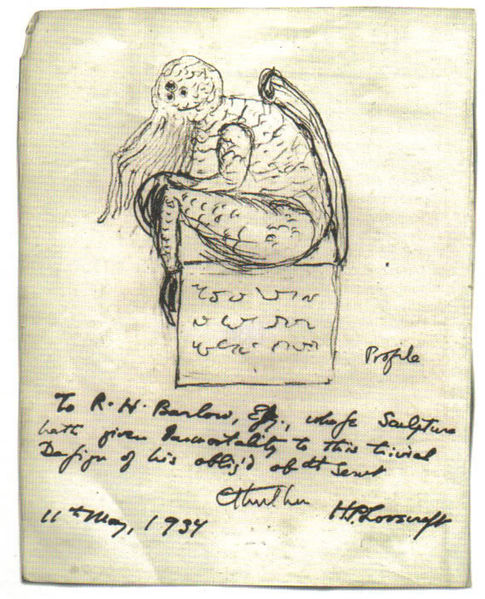General, News, See Page XX
Correspondents in Trail of Cthulhu
In him, however, the family mentality had veered away from practical affairs to pure scholarship; so that he had been a notable student of mathematics, astronomy, biology, anthropology, and folklore at the University of Vermont. I had never previously heard of him, and he did not give many autobiographical details in his communications; but from the first I saw he was a man of character, education, and intelligence, albeit a recluse with very little worldly sophistication.
– The Whisperer in Darkness
Lovecraft was a prodigious letter-writer, sending more than 100,000 over the course of his life. No wonder, then, that his protagonists did likewise – Wilmarth in The Whisperer in Darkness and Thurston in The Call of Cthulhu are the two most obvious examples.
Night’s Black Agents introduces a new general ability called Network, which lets you whistle up contacts and allies as needed; you can pull out your burner phone and call up that Iranian arms dealer who owes you a favour, or have an agent in place inside the Smithsonian. In Trail of Cthulhu, with its slower pace of communication and emphasis on creeping horror, Network becomes Correspondence.
You buy Correspondence like any other General Ability; possessing even a point of Correspondence means you’ve got a wide circle of friends and colleagues that you regularly correspond with through letter, telegram, and even the occasional phone call or in-person meeting. You don’t need to specify who these friends are until you call on them in the game.
At any point, you may allocate a point of Correspondence to create a new NPC Correspondent. Each point you spend gives that NPC two points to spend on any Investigative abilities. Note the NPCs’ name and abilities down on your character sheet. Points used to create an NPC stay allocated to that NPC forever – they don’t refresh at the end of the adventure. If you want to keep your Correspondence pool topped up, you’ll need to spend experience points on it.
The NPCs you create are, by default, in some distant city. They’re not around to help you directly, but you can write to them and ask them for their advice (in other words, you can spend their Investigative Abilities to get benefits, but you’ll need to wait some time for their reply to come back).
For example, Willoughby Boothroyd just discovered a curious idol in a cellar, but lacks the Anthropology needed to understand its significance. His player permanently spends two points of Correspondents and declares that Boothroyd’s cousin Cecil is a noted archaeologist and ethnographer. Those two points of Correspondents translate to four investigative ability points for Cecil; he’s now got Anthropology 3 and Archaeology 1. Boothroyd’s player notes ‘Cousin Cecil: Anthropology 3, Archaeology 1’ down as a contact. Boothroyd stuffs the idol into a packing crate and sends it off to Cecil. A few days later, he receives Cecil’s report on the idol, which contain the clues obtainable with a 2-point Anthropology spend.
Your correspondents can be assumed to be trustworthy, reliable people – they might not share your belief in the supernatural, but they won’t dismiss your requests for information out of hand. At the very least, they’ll humour you; more likely, they’ll be drawn into the mystery of the Mythos themselves.
Correspondents & Core Clues
A beneficent Keeper – if such a thing were not a contradiction in terms – might allow a player to get a Core Clue from an ability she doesn’t possess, but one of her Correspondents does.
Martha doesn’t have Physics, but an old friend of hers is now a professor of physics at Cambridge. The symbols scrawled in the witch’s cottage remind her of some diagrams he once showed to her – something about folds in space and time? Perhaps she should contact her old friend and see if he can shed light on the mystery.
Spending Correspondence
In addition to creating contacts with the ability, you may also spend Correspondence points for some extra benefits:
- Spend 1 point to get a reply to a request as fast as is humanly possible (by telegraph, telephone, or return of post).
- Spend 2 points (or 1 point of Correspondence and 1 point from an Interpersonal Ability like Credit Rating or Flattery) to have your Correspondent come to visit you in person and put their skills at your disposal.
- If you’re about to die horribly, you can spend 1 point of Correspondence to retroactively declare that you send a copy of your notes, or your diary, or some other documentation to one of your Correspondents before you went on this last investigation. Your Correspondent becomes your next player character, and starts with a point of Cthulhu Mythos thanks to your final revelation.
Correspondence points spent for benefits refresh at the end of the adventure.
Dead Correspondents
This being Trail of Cthulhu, your Correspondents are going to delve into matters that man was not meant to know and die horribly. If the Keeper eliminates one of your existing Correspondents as a plot hook, then the Correspondence points used to create that NPC are refunded. On the other hand, if you get one of your Correspondents killed (either by bringing them directly into the adventure, or inadvertently sending them a radioactive idol like poor cousin Cecil), then the points are lost permanently, and you lose at least one point of Stability to boot.
Trail of Cthulhu is an award-winning horror roleplaying game set in the 1930s, produced under license from Chaosium. Whether you’re playing in two-fisted Pulp mode or sanity-shredding Purist mode, its GUMSHOE system is finely tuned to investigative adventures where the challenge is in interpreting clues, not finding them. Pick up Trail of Cthulhu and its many supplements and adventures in the Pelgrane Shop.


